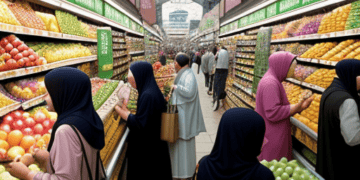In an effort to ease the financial burden on consumers during Ramadan, the government’s recent tariff reductions on essential commodities have paradoxically been followed by price increases in the market. These measures, intended to stabilize prices, have sparked criticism from traders who argue that the price control efforts have disproportionately benefited large importers due to a dollar crisis that has hampered the ability of many to import goods.
On February 8, the government significantly lowered the rice import duty and tax from 63% to 15%, reduced the supplementary duty on imports by 20%, and cut the VAT on refined and crude soybean and palm oil from 15% to 10%. Additionally, the fixed duty on sugar imports was reduced from Tk1,500 to Tk1,000 per tonne, and the import duty on dates was cut from 58% to 43%.
Despite these efforts, prices for sugar and edible oils have risen in Chattogram’s Khatunganj, Bangladesh’s largest wholesale commodity market. Wholesale prices for sugar and various types of oil have seen noticeable increases, with sugar reaching Tk134 per kg and soybean oil priced at Tk161 per litre.
Local traders attribute the limited impact of duty reductions on market prices to the challenges in importing goods, with only a select few importers managing to navigate the current financial constraints. This has effectively limited market participation to 10-15 major importers, according to Nurul Alam, owner of A Zaman Enterprise. Critics argue that the duty and tax reductions have thus far only added benefits for these larger players without translating to lower prices for consumers.
M Najer Hossain, vice president of the Consumers Association of Bangladesh (CAB), highlighted the lack of support for ordinary traders facing difficulties in opening letters of credit, a necessary step for importing goods.
Market visits to kitchen markets in Kallyanpur and Karwan Bazar revealed that retail prices for essential items remain high, unaffected by the government’s tariff reductions. The price of chickpeas, a staple during Ramadan, has notably increased, with a significant portion of the demand being met by a limited number of importers.
In response to concerns about market monopolization and the price surges of essential commodities, State Minister for Commerce Ahsanul Islam Titu assured that measures would be taken to prevent market monopolies and emphasized efforts to maintain a steady supply of daily necessities from India and other neighboring countries. The government remains committed to ensuring an adequate supply of essential goods and addressing artificial shortages or price manipulations by traders.
Your go-to for supply chain report news updates: The Supply Chain Report. For international trade tools, see ADAMftd.com.
#TariffReductions #ConsumerProtection #BangladeshEconomy #ImportChallenges #EssentialGoods #FoodPrices #WholesaleMarket #Chattogram #CommodityMarket #FinancialConstraints #DutyReductionImpact #MonopolyConcerns #ConsumerAssociationBangladesh #CAB #MarketRegulation















